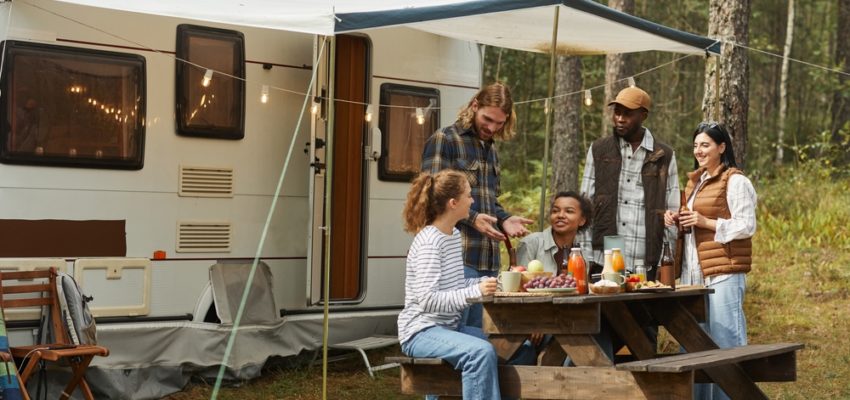RV and Travel Trailer Safety Tips

Summer is in full swing, which means RV season is here. Before you head out on your next adventure with family or friends, we’re here to help make sure you enjoy it as safely as possible. Here are our top RV safety tips to keep in mind this season.
1. Be aware of your surroundings.
It can be very fun to set out on a spontaneous adventure—but you should also be sure to plan your route carefully. It’s always a good idea to let someone know where you’re going and how they can reach you. One way to do this is to share your location with an emergency contact—many modern navigation programs allow this, including Google Maps. It’s also wise to locate emergency rooms, hospitals, and (if you’re bringing a pet along for the ride) vet clinics on your route. It’s better to be safe than sorry, so camp in parks and places where you feel comfortable—and always trust your instincts. If you’re feeling unsafe, choose a different location. Lastly, make sure you’re aware of road conditions and adjust your speed and distance for weather events, like snow, that may slow you down and change your expected arrival times.
2. Check travel conditions.
Speaking of weather—make sure you check conditions for both your travel route and your destination before starting your trip. Inclement weather can lower visibility and make RV driving dangerous. For extra safety, sign up for weather alerts linked to the county you’ll be in, and remember to carry an emergency radio to tune-in for updates in the event of a storm.
On that note, a storm plan that you prepare and write down ahead of time can help you prepare you and your family and should be reviewed regularly—similar to a tornado drill.
Besides stormy weather, hot temperature can be another safety hazard, especially if pets are onboard. Installing a wireless RV pet safety temperature monitor that syncs to your smartphone, or a camera to keep an eye on your furry friends while you explore away from your vehicle or trailer, can help keep them safe and cool.
3. Know the height, weight, and length of your RV.
Be aware of your RV’s height restrictions, combined gross weight and length restrictions, and fuel tank capacity. This will help you plan for overpasses, bridges, tunnels, winding roads, and distance between gas stations. You should follow all safe load limits and be aware of load limits and equipment upgrade needs when towing.
Remember, speed + weight = a longer time to stop! Be sure to maintain a greater distance from the vehicles in front of you than you would driving a car to allow for a safe braking distance and to give yourself time to react.
Specific RV apps and GPS are designed to calculate your RVs dimensions and help you map your route, but you should always carry a hard copy roadmap and know your vehicle’s dimensions in the event of lost signal.
4. Practice driving.
No matter how good a driver you think you are, safely operating your RV requires time and practice, especially as you’re likely to be traveling unfamiliar roads on your adventures. Before embarking on your journey, practice making turns, changing lanes, braking at various distances, backing up, and parking—somewhere safe. Also get comfortable towing your RV, and remember you can schedule a pick up and delivery to a campsite if you’re not ready. Fellow RVers at your campground can be a great resource for learning if you’re a first-timer.
5. Plan ahead.
Checklists are a great way to keep RV planning and trip prep manageable. Camping World offers checklists for vehicle prep, kids and pets, packing supplies, pre-departure, and post-trip cleaning and maintenance.
6. Get RV Insurance.
Before you hit the road in your RV, it’s important to make sure you and your vehicle are properly protected in the event of an accident—and to always carry a hard copy of your insurance contact number and policy information. Contact a local Bearingstar agent today to learn about your coverage options and how to get the best protection and peace of mind this season.
Call us at 877-801-7424 in Massachusetts, and 888-519-9996 in Connecticut.
Sources:
Ask an Expert: Essential RV Safety for Every Road Trip. Camping World.
https://blog.campingworld.com/rv-basics/ask-an-expert-essential-rv-safety-for-every-road-trip/
